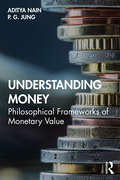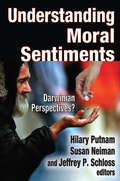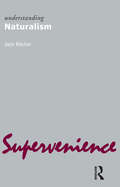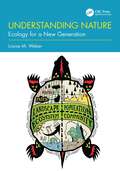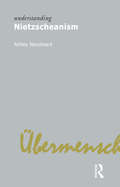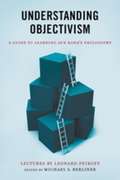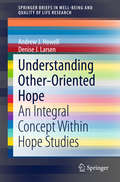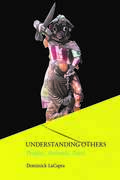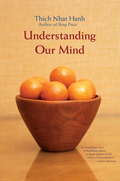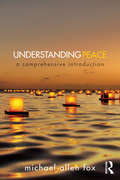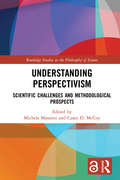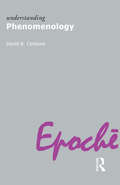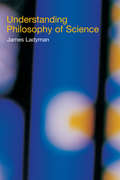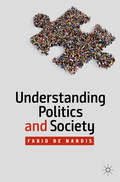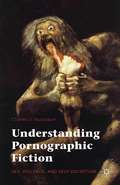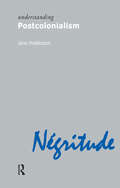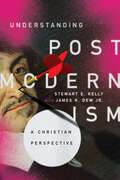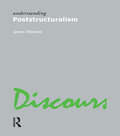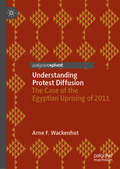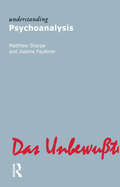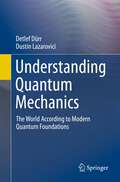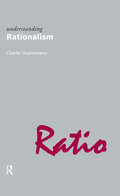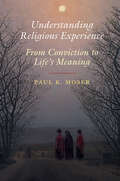- Table View
- List View
Understanding Money: Philosophical Frameworks of Monetary Value
by P. G. Jung Aditya NainThis book offers a novel understanding of money by moving away from the dominant lens of economics through which it is usually seen. In contrast to the economic frameworks of "money", the volume examines philosophical discourses on money through conceptual frameworks that explain how monetary value manifests in various empirical monetary systems. It showcases how the increasingly abstract nature of the objects that stand proxy for money could be conceptualized ontologically, highlighting the predominance of digital money today, as well as contemporary monetary innovations such as cryptocurrencies like Bitcoin. Provocative, yet grounded in a sound theoretical framework, this book will be of interest to scholars, students, and teachers interested in money or monetary value, across various domains and disciplines such as philosophy, economics, sociology, anthropology, finance, science, and technology studies, as well as the interested general reader.
Understanding Moral Obligation
by Robert SternIn many histories of modern ethics, Kant is supposed to have ushered in an anti-realist or constructivist turn by holding that unless we ourselves 'author' or lay down moral norms and values for ourselves, our autonomy as agents will be threatened. In this book, Robert Stern challenges the cogency of this 'argument from autonomy', and claims that Kant never subscribed to it. Rather, it is not value realism but the apparent obligatoriness of morality that really poses a challenge to our autonomy: how can this be accounted for without taking away our freedom? The debate the book focuses on therefore concerns whether this obligatoriness should be located in ourselves (Kant), in others (Hegel) or in God (Kierkegaard). Stern traces the historical dialectic that drove the development of these respective theories, and clearly and sympathetically considers their merits and disadvantages; he concludes by arguing that the choice between them remains open.
Understanding Moral Sentiments: Darwinian Perspectives?
by Hilary PutnamThis volume brings together leading scholars to examine Darwinian perspectives on morality from widely ranging disciplines: evolutionary biology, anthropology, psychology, philosophy, and theology. They bring not only varied expertise, but also contrasting judgments about which, and to what extent, differing evolutionary accounts explain morality. They also consider the implications of these explanations for a range of religious and non-religious moral traditions.The book first surveys scientific understandings of morality. Chapters by Joan Silk and Christopher Boehm ask what primatology and anthropology tell us about moral origins. Daniel Batson and Stephen Pinker provide contrasting accounts of how evolution shapes moral psychology, and Jeffrey Schloss assesses a range of biological proposals for morality and altruism. Turning to philosophical issues, Martha Nussbaum argues that recognizing our animal nature does not threaten morality. Stephen Pope and Timothy Jackson explore how Darwinian accounts of moral goodness both enrich and require understandings outside the sciences. Hilary Putnam and Susan Neiman ask whether Darwin is truly useful for helping us to understand what morality actually is and how it functions.The book is a balanced effort to assess the scientific merits and philosophical significance of emerging Darwinian perspectives on morality.
Understanding Naturalism (Understanding Movements In Modern Thought Ser.)
by Jack RitchieMany contemporary Anglo-American philosophers describe themselves as naturalists. But what do they mean by that term? Popular naturalist slogans like, "there is no first philosophy" or "philosophy is continuous with the natural sciences" are far from illuminating. "Understanding Naturalism" provides a clear and readable survey of the main strands in recent naturalist thought. The origin and development of naturalist ideas in epistemology, metaphysics and semantics is explained through the works of Quine, Goldman, Kuhn, Chalmers, Papineau, Millikan and others. The most common objections to the naturalist project - that it involves a change of subject and fails to engage with "real" philosophical problems, that it is self-refuting, and that naturalism cannot deal with normative notions like truth, justification and meaning - are all discussed. "Understanding Naturalism" distinguishes two strands of naturalist thinking - the constructive and the deflationary - and explains how this distinction can invigorate naturalism and the future of philosophical research.
Understanding Nature: Ecology for a New Generation
by Louise M. WeberUnderstanding Nature is a new kind of ecology textbook: a straightforward resource that teaches natural history and ecological content, and a way to instruct students that will nurture both Earth and self. While meeting the textbook guidelines set forth by the Ecological Society of America, Understanding Nature has a unique ecotherapy theme, using a historical framework to teach ecological theory to undergraduates. This textbook presents all the core information without being unnecessarily wordy or lengthy, using simple, relatable language and discussing ecology in ways that any student can apply in real life. Uniquely, it is also a manual on how to improve one’s relationship with the Earth. This is accomplished through coverage of natural history, ecology, and applications, together with suggested field activities that start each chapter and thinking questions that end each chapter. The book includes traditional ecological knowledge as well as the history of scientific ecological knowledge. Understanding Nature teaches theory and applications that will heal the Earth. It also teaches long-term sustainability practices for one’s psyche. Professor Louise Weber is both an ecologist and a certified ecopsychologist, challenging ecology instructors to rethink what and how they teach about nature. Her book bridges the gap between students taking ecology to become ecologists and those taking ecology as a requirement, who will use the knowledge to become informed citizens.
Understanding Nietzscheanism (Understanding Movements In Modern Thought Ser.)
by Ashley WoodwardNietzsche's critiques of traditional modes of thinking, valuing and living, as well as his radical proposals for new alternatives, have been vastly influential in a wide variety of areas, such that an understanding of his philosophy and its influence is important for grasping many aspects of contemporary thought and culture. However Nietzsche's thought is complex and elusive, and has been interpreted in many ways. Moreover, he has influenced starkly contrasting movements and schools of thought, from atheism to theology, from existentialism to poststructuralism, and from Nazism to feminism. This book charts Nietzsche's influence, both historically and thematically, across a variety of these contrasting disciplines and schools of interpretation. It provides both an accessible introduction to Nietzsche's thought and its impact and an overview of contemporary approaches to Nietzsche.
Understanding Objectivism
by Leonard Peikoff Michael S. BerlinerBased on a series of lectures given in 1983 by Dr. Leonard Peikoff, Understanding Objectivism offers a deeper and more profound study of Ayn Rand's philosophy, and outlines a methodology of how to approach the study of Objectivism and apply its principles to one's life.For the legions of readers who treasure Atlas Shrugged and The Fountainhead, and who savor cogent analysis and provocative discussion of Ayn Rand's thoughts and beliefs, Understanding Objectivism takes the stimulating study of Rand's philosophy to the next level.
Understanding Objectivism: A Guide to Learning Ayn Rand's Philosophy
by Leonard Peikoff Michael S. BerlinerBased on a series of lectures given in 1983 by Dr. Leonard Peikoff, Understanding Objectivism offers a deeper and more profound study of Ayn Rand's philosophy, and outlines a methodology of how to approach the study of Objectivism and apply its principles to one's life.For the legions of readers who treasure Atlas Shrugged and The Fountainhead, and who savor cogent analysis and provocative discussion of Ayn Rand's thoughts and beliefs, Understanding Objectivism takes the stimulating study of Rand's philosophy to the next level.
Understanding Other-Oriented Hope
by Andrew J. Howell Denise J. LarsenThis Brief integrates the literature and research on other-oriented hope. It discusses the position of other-oriented hope as one manifestation of the broader attribute of other-interest and argues the importance of other-interest in well-being. The Brief examines definitions and attributes of other-oriented hope, based upon theoretical and empirical understandings of hope more generally. Thereafter it reviews both qualitative and quantitative research findings concerning the occurrence of other-oriented hope in several domains, including other-oriented hope among parents of ill children, other-oriented hope among caregivers and other-oriented hope among the elderly. Several theoretical frameworks for understanding the phenomenon of other-oriented hope are considered, as are the functions of and elements comprising, other-oriented hope. The differentiation of other-oriented hope and related concepts, such as compassion and love, is considered. Finally, the brief examines the application of other-oriented hope to practical work in counselling and caregiving and outlines several directions for future work on other-oriented hope.
Understanding Others: Peoples, Animals, Pasts
by Dominick LaCapraTo what extent do we and can we understand others—other peoples, species, times, and places? What is the role of others within ourselves, epitomized in the notion of unconscious forces? Can we come to terms with our internalized others in ways that foster mutual understanding and counteract the tendency to scapegoat, project, victimize, and indulge in prejudicial and narcissistic impulses? How do various fields or disciplines address or avoid such questions? And have these questions become particularly pressing and not in the least confined to other peoples, times, and places? Making selective and critical use of the thought of such important figures as Sigmund Freud, Jacques Derrida, and Mikhail Bakhtin, in Understanding Others Dominick LaCapra investigates a series of crucial topics from the current state of deconstruction, trauma studies, and the humanities to newer fields such as animal studies and posthumanist scholarship. LaCapra adroitly brings critical historical thought into a provocative engagement with politics and our current political climate. This is LaCapra at his best, critically rethinking major currents and exploring the old and the new in combination, often suggesting what this means in the age of Trump.
Understanding Our Mind: 51 Verses on Buddhist Psychology
by Thich Nhat HanhA finalist for the 2001 Nautilus Award, Understanding Our Mind, is Thich Nhat Hanh's profound look at Buddhist psychology with insights into how these ancient teachings apply to the modern world. Based on the fifty verses on the nature of consciousness taken from the great fifth-century Buddhist master Vasubandhu and the teachings of the Avatamsaka Sutra, Thich Nhat Hanh focuses on the direct experience of recognizing, embracing, and looking deeply into the nature of our feelings and perceptions. Presenting the basic teachings of Buddhist applied psychology, Understanding Our Mind shows us how our mind is like a field, where every kind of seed is planted--seeds of suffering, anger, happiness, and peace. The quality of our life depends on the quality of the seeds in our mind. If we know how to water seeds of joy and transform seeds of suffering, then understanding, love, and compassion will flower. Vietnamese Zen Master Thuong Chieu said, "When we understand how our mind works, the practice becomes easy."
Understanding Peace: A Comprehensive Introduction
by Michael Allen FoxUnderstanding Peace: A Comprehensive Introduction fills the need for an original, contemporary examination of peace that is challenging, informative, and empowering. This well-researched, fully documented, and highly accessible textbook moves beyond fixation on war to highlight the human capacity for nonviolent cooperation in everyday life and in conflict situations. After deconstructing numerous ideas about war and explaining its heavy costs to humans, animals, and the environment, discussion turns to evidence for the existence of peaceful societies. Further topics include the role of nonviolence in history, the nature of violence and aggression, and the theory and practice of nonviolence. The book offers two new moral arguments against war, and concludes by defining peace carefully from different angles and then describing conditions for creating a culture of peace. Understanding Peace brings a fresh philosophical perspective to discussions of peace, and also addresses down-to-earth issues about effecting constructive change in a complex world. The particular strength of Understanding Peace lies in its commitment to reflecting on and integrating material from many fields of knowledge. This approach will appeal to a diverse audience of students and scholars in peace studies, philosophy, and the social sciences, as well as to general-interest readers.
Understanding Perspectivism: Scientific Challenges and Methodological Prospects (Routledge Studies in the Philosophy of Science)
by Michela Massimi Casey D. McCoyThis edited collection is the first of its kind to explore the view called perspectivism in philosophy of science. The book brings together an array of essays that reflect on the methodological promises and scientific challenges of perspectivism in a variety of fields such as physics, biology, cognitive neuroscience, and cancer research, just as a few examples. What are the advantages of using a plurality of perspectives in a given scientific field and for interdisciplinary research? Can different perspectives be integrated? What is the relation between perspectivism, pluralism, and pragmatism? These ten new essays by top scholars in the field offer a polyphonic journey towards understanding the view called ‘perspectivism’ and its relevance to science.
Understanding Phenomenology (Understanding Movements In Modern Thought Ser.)
by David R. Cerbone"Understanding Phenomenology" provides a guide to one of the most important schools of thought in modern philosophy. The book traces phenomenology's historical development, beginning with its founder, Edmund Husserl and his "pure" or "transcendental" phenomenology, and continuing with the later, "existential" phenomenology of Martin Heidegger, Jean-Paul Sartre, and Maurice Merleau-Ponty. The book also assesses later, critical responses to phenomenology - from Derrida to Dennett - as well as the continued significance of phenomenology for philosophy today. Written for anyone coming to phenomenology for the first time, the book guides the reader through the often bewildering array of technical concepts and jargon associated with phenomenology and provides clear explanations and helpful examples to encourage and enhance engagement with the primary texts.
Understanding Philosophy of Science
by James LadymanFew can imagine a world without telephones or televisions; many depend on computers and the Internet as part of daily life. Without scientific theory, these developments would not have been possible.In this exceptionally clear and engaging introduction to philosophy of science, James Ladyman explores the philosophical questions that arise when we reflect on the nature of the scientific method and the knowledge it produces. He discusses whether fundamental philosophical questions about knowledge and reality might be answered by science, and considers in detail the debate between realists and antirealists about the extent of scientific knowledge. Along the way, central topics in philosophy of science, such as the demarcation of science from non-science, induction, confirmation and falsification, the relationship between theory and observation and relativism are all addressed. Important and complex current debates over underdetermination, inference to the best explaination and the implications of radical theory change are clarified and clearly explained for those new to the subject.
Understanding Politics and Society
by Fabio de NardisThis textbook presents political sociology as a connective social science that studies political phenomena by creating fruitful connections with other perspectives. The relationship between politics and society is more complex than ever due to the emergence of new power structures, forms of conflict organization and management, and social practices of political participation. Several scholars describe this historical phase as the 'de-politicization of representative politics'. The book addresses classical themes of and approaches to political sociology, but also dedicates several chapters to contemporary developments within political sociology, including, for instance, the role of the internet and bottom-up political communication in social movements. In addition, the volume acts as a professional tool for those scholars and researchers that are beginning to study political processes from a sociological perspective.
Understanding Pornographic Fiction: Sex, Violence, and Self-Deception
by Charles NussbaumThis work defends two main theses. First, modern Western pornographic fiction functions as a self-deceptive vehicle for sexual or blood-lustful arousal; and second, that its emergence owes as much to Puritan Protestantism and its inner- or this-worldly asceticism as does the emergence of modern rationalized capitalism.
Understanding Postcolonialism (Understanding Movements In Modern Thought Ser.)
by Jane HiddlestonPostcolonialism offers challenging and provocative ways of thinking about colonial and neocolonial power, about self and other, and about the discourses that perpetuate postcolonial inequality and violence. Much of the seminal work in postcolonialism has been shaped by currents in philosophy, notably Marxism and ethics. "Understanding Postcolonialism" examines the philosophy of postcolonialism in order to reveal the often conflicting systems of thought which underpin it. In so doing, the book presents a reappraisal of the major postcolonial thinkers of the twentieth century.Ranging beyond the narrow selection of theorists to which the field is often restricted, the book explores the work of Fanon and Sartre, Gandhi, Nandy, and the Subaltern Studies Group, Foucault and Said, Derrida and Bhabha, Khatibi and Glissant, and Spivak, Mbembe and Mudimbe. A clear and accessible introduction to the subject, "Understanding Postcolonialism" reveals how, almost half a century after decolonisation, the complex relation between politics and ethics continues to shape postcolonial thought.
Understanding Postmodernism: A Christian Perspective
by James K. Dew Jr.Postmodernity has matured. But the challenge of navigating our contemporary culture remains. In order for Christians to make wise decisions, we first need to understand the many facets of our postmodern context. If René Descartes is often identified as the first truly modern philosopher in light of his confidence in human reason, then postmodernism has taken Descartes to the woodshed. Stewart Kelly and James Dew detail the litany of concerns that postmodernism has raised: overconfidence in human reason, the limitations of language, the relativity of truth, the lack of a truly objective view, the inherently oppressive nature of metanarratives, the instability of the human self, and the absence any moral superiority. With wisdom and care, Kelly and Dew compare these postmodern principles with the gospel of Jesus Christ and the Christian faith. What emerges is neither a rejection of everything postmodernism is concerned with nor a wholesale embrace of all that it affirms. Instead, we are encouraged to understand the postmodern world as we seek to mature spiritually in Christ.
Understanding Poststructuralism (Understanding Movements In Modern Thought Ser.)
by James WilliamsUnderstanding Poststructuralism presents a lucid guide to some of the most exciting and controversial ideas in contemporary thought. This is the first introduction to poststructuralism through its major theorists - Derrida, Deleuze, Foucault, Lyotard, Kristeva - and their central texts. Each chapter takes the reader through a key text, providing detailed summaries of the main points of each and a critical and detailed analysis of their central arguments. Ideas are clearly explained in terms of their value to both critical thinking and to contemporary issues. Criticisms of poststructuralism are also assessed. The aim throughout is to illuminate the main methods of poststructuralism - deconstruction, libidinal economics, genealogy and transcendental empiricism - in context. A balanced and up-to-date assessment of poststructuralism, the book presents the ideal introduction to this most revolutionary of philosophies.
Understanding Protest Diffusion: The Case of the Egyptian Uprising of 2011
by Arne F. WackenhutThis book traces the mobilization process leading up to the January 25 Uprising, and furthers our understanding of the largely unexpected diffusion of protest during this Egyptian Revolution. Focusing on the role of the so-called “Cairo-based political opposition,” this study strongly suggests a need to pay closer attention to the complexity and contingent nature of such large-scale protest episodes. Building on interviews with activists, employees of NGOs in the human rights advocacy sector, and journalists, this in-depth single case study reveals how different movement organizations in the Egyptian prodemocracy movement had long, and largely unsuccessfully, tried to mobilize support for socio-political change in the country. Against this backdrop, the book illustrates how a coalition of activists sought to organize a protest event against police brutality in early 2011. The resulting protests on January 25 surprised not only the regime of Hosni Mubarak, but also the organizers.
Understanding Psychoanalysis (Understanding Movements In Modern Thought Ser.)
by Matthew Sharpe Joanne Faulkner"Understanding Psychoanalysis" presents a broad introduction to the key concepts and developments in psychoanalysis and its impact on modern thought. Charting pivotal moments in the theorization and reception of psychoanalysis, the book provides a comprehensive account of the concerns and development of Freud's work, as well as his most prominent successors, Melanie Klein and Jacques Lacan.The work of these leading psychoanalytic theorists has greatly influenced thinking across other disciplines, notably feminism, film studies, poststructuralism, social and cultural theory, the philosophy of science and the emerging discipline of neuropsychoanalysis. Analysing this engagement with other disciplines and their key theorists, "Understanding Psychoanalysis" argues for a reconsideration of psychoanalysis as a resource for philosophy, science, and cultural studies.
Understanding Quantum Mechanics: The World According to Modern Quantum Foundations
by Detlef Dürr Dustin LazaroviciThis book discusses the physical and mathematical foundations of modern quantum mechanics and three realistic quantum theories that John Stuart Bell called "theories without observers" because they do not merely speak about measurements but develop an objective picture of the physical world. These are Bohmian mechanics, the GRW collapse theory, and the Many Worlds theory. The book is ideal to accompany or supplement a lecture course on quantum mechanics, but also suited for self-study, particularly for those who have completed such a course but are left puzzled by the question: "What does the mathematical formalism, which I have so laboriously learned and applied, actually tell us about nature?”
Understanding Rationalism (Understanding Movements In Modern Thought Ser.)
by Charlie HuenemannThe three great historical philosophers most often associated with rationalism - Descartes, Spinoza and Leibniz - opened up ingenious and breathtaking vistas upon the world. Yet their works are so difficult that readers often find themselves stymied. "Understanding Rationalism" offers a guide for anyone approaching these thinkers for the first time.With clear explanations, elegant examples and insightful summaries, "Understanding Rationalism" unlocks their intricate metaphysical systems, which are by turns surprising, compelling and sometimes bizarre. It also lays out their controversial stances on moral, political and religious problems. The study is framed by an opening discussion of the broad themes and attitudes common to these three philosophers and a closing analysis of the legacy they left for the rest of philosophy.
Understanding Religious Experience: From Conviction to Life's Meaning
by Paul K. MoserIn this book, Paul K. Moser offers a new approach to religious experience and the kind of evidence it provides. Here, he explains the nature of theistic and non-theistic experience in relation to the meaning of human life and its underlying evidence, with special attention given to the perspectives of Tolstoy, Buddha, Confucius, Krishna, Moses, the apostle Paul, and Muhammad. Among the many topics explored in this timely volume are: religious experience characterized in a unifying conception; religious experience naturalized relative to science; religious experience psychologized in merely psychological phenomena; and religious experience cognized relative to potential defeaters from evil, divine hiddenness, and religious diversity. Understanding Religious Experience will benefit those interested in the nature of religion and can be used in relevant courses in religious studies, philosophy, theology, Biblical studies, and the history of religion.
